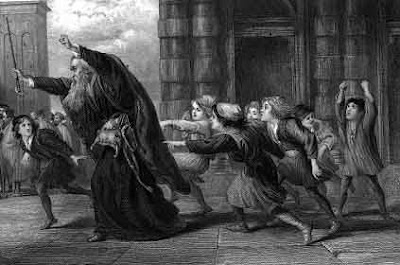Preston Smith Brooks (August 5, 1819 – January 27, 1857) was a Congressman from South Carolina, notorious for brutally assaulting senator Charles Sumner on the floor of the United States Senate.
On May 22, 1856, Brooks beat Senator Charles Sumner with his Gutta-percha wood walking cane in the Senate chamber because of a speech Sumner had made three days previous criticizing President Franklin Pierce and Southerners who sympathized with the pro-slavery violence in Kansas ("Bleeding Kansas"). In particular, Sumner lambasted Brooks' kinsman, Senator Andrew Butler, who was not in attendance when the speech was read, describing slavery as a harlot, comparing Butler with Don Quixote for embracing it, and mocking Butler for a physical handicap. Senator Stephen Douglas of Illinois, who was also a subject of abuse during the speech, suggested to a colleague while Sumner was orating that "this damn fool [Sumner] is going to get himself shot by some other damn fool." (Jordan et. al The Americans)
At first intending to challenge Sumner to a duel, Brooks consulted with fellow South Carolina Rep. Laurence M. Keitt on dueling etiquette. Keitt instructed him that dueling was for gentlemen of equal social standing, and suggested that Sumner occupied a lower social status comparable to a drunkard due to the supposedly coarse language he had used during his speech. Brooks thus decided to attack Sumner with a cane.
Two days after the speech, on the afternoon of May 22, Brooks confronted Sumner as he sat writing at his desk in the almost empty Senate chamber. Brooks was accompanied by Laurence M. Keitt, also of South Carolina, and Henry A. Edmundson of Virginia. Brooks said, "Mr. Sumner, I have read your speech twice over carefully. It is a libel on South Carolina, and Mr. Butler, who is a relative of mine." As Sumner began to stand up, Brooks began beating Sumner on the head with his thick gutta-percha cane with a gold head. Sumner was trapped under the heavy desk (which was bolted to the floor), but Brooks continued to bash Sumner until he ripped the desk from the floor. By this time, Sumner was blinded by his own blood, and he staggered up the aisle and collapsed, lapsing into unconsciousness. Brooks continued to beat Sumner until he broke his cane, then quietly left the chamber. Several other senators attempted to help Sumner, but were blocked by Keitt who was holding a pistol and shouting "Let them be!"
Sumner was unable to return to duty for more than three years while he recovered. He later became one of the most influential Radical Republicans throughout the conduct of the American Civil War, and on through the early years of Reconstruction.
South Carolinians sent Brooks dozens of brand new canes to replace the one he had broken. The Richmond Enquirer crowed: "We consider the act good in conception, better in execution, and best of all in consequences. These vulgar abolitionists in the Senate must be lashed into submission."
Brooks survived an expulsion vote in the House but resigned his seat, claiming both that he "meant no disrespect to the Senate of the United States" by attacking Sumner and that he did not intend to kill him, for he would have used a different weapon if he had. His constituents thought of him as a hero and returned him to Congress. However, Brooks attack on Sumner was regarded in the north as the act of a cowardly barbarian. One of the bitterest critics of the attack was Sumner's fellow New Englander, Congressman Anson Burlingame. When Burlingame denounced Brooks as a coward on the floor of the House, Brooks challenged him to a duel, and Burlingame accepted the challenge. Burlingame, as the challenged party, specified rifles as the weapons,and to get around American anti-dueling laws he named the Navy Yard on the Canadian side of Niagara Falls as the site. Brooks backed out of the challenge, claiming that he would be murdered on his way north. There was probably some justification to that claim, but Burlingame's reputation as a deer hunter and a deadly shot whith a rifle could also have been a factor. Brooks remained in office until his death from the croup in 1857 and is buried in Edgefield, South Carolina.
(thanks, Wikipedia)





